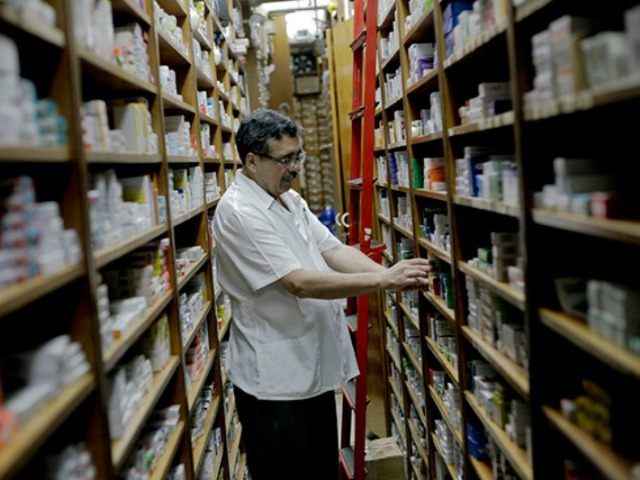The Venezuela Pharmaceutical Federation is making demands for socialist President Nicolás Maduro to declare a “humanitarian emergency” due to the extreme shortages of drugs throughout the country, as medications ranging from simple antibiotics to cancer and AIDS drugs are nowhere to be found.
“The national government must accept we are in a humanitarian crisis in the health sector, with patients dying across our territory for lack of medicines,” Freddy Ceballos, the president of the federation, said in a statement this week. He added, “It’s necessary to activate all mechanisms of international health assistance to solve this crisis as soon as possible.” Reuters notes that the federation expressed particular concern over 150 medications that pharmacies throughout the country had have little to no luck stocking over the past year.
Ceballos’ vice president, Yolanda Carrasquel, told reporters that mental health medications to treat convulsions, depression, and bipolar disorder are especially difficult to find. “We are talking 100 percent shortage on a national level,” she said. “There is no way to guarantee the health of Venezuelans.”
The lack of medication has become so pervasive that Venezuelan criminal records are beginning to reflect them. This week, a 22-year-old ice cream vendor was stabbed to death after purchasing goods at a pharmacy, with the thieves hoping to re-sell the goods at prohibitive prices.
The Federation has warned the government and international parties on multiple occasions that Venezuela has been severely lacking medical supplies. In December, Ceballos warned that, as the Venezuelan government owes the nation’s pharmacies $4 billion, 85 percent of the nation’s pharmacies were likely to go bankrupt within the next year. “The problem is not only drug shortages, but the Venezuelan government fixed price laws froze prices in a range where the commercial chain loses,” Ceballos noted then, adding that pharmacies had resorted to prescribing veterinary medications to patients as a last resort.
Venezuela’s health care system – financed in large part by oil sales and controlled by Cuban medical forced laborers – has been in freefall for years. Shortly after the death of dictator Hugo Chávez, doctors began to warn that they were struggling to keep hospitals and private practices stocked with basic items like syringes, imaging paper, and anesthesia. The next year, a report found that hospitals in the country had almost entirely stopped treatments that would save injured limbs, leading to a surge in limb amputations. With hospitals lacking stents, thousands of patients did not receive the treatment necessary to prevent heart attacks.
Hospitals have also recorded a lack of funding for other basic requirements, like sanitation equipment. A hospital last year recorded 17 infant deaths directly related to a possum infestation staff were ill-equipped to confront, lacking cleaning materials or the funds to hire an exterminator.
Members of Venezuela’s anti-socialist opposition have responded to the call, issuing a statement vowing to emphasize the damage Venezuela’s economic system has done to its health infrastructure. “We have to make clear that corruption in Venezuela is killing our people,” Freddy Guevara, the acting head of the opposition Popular Will party, said this week. “Today, Venezuelans are dying due to lack of medications and are forced to make lines to buy food, precisely because the money that should be used to import and to solve these problems has disappeared.”
The opposition, represented in a conglomerate party called the Democratic Unity Roundtable, took the majority over from the Socialist Party in the National Assembly this December for the first time in 17 years, promising a wide variety of reforms to both aid the economy’s recovery and free the nation’s prisoners of conscience.

COMMENTS
Please let us know if you're having issues with commenting.